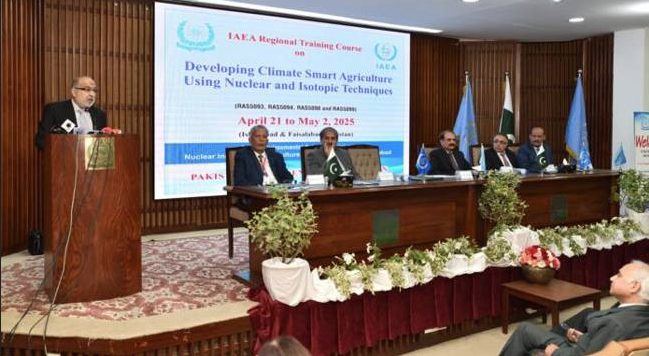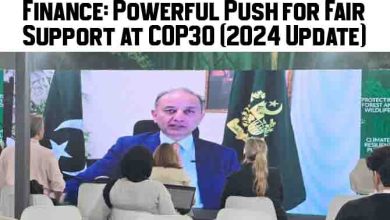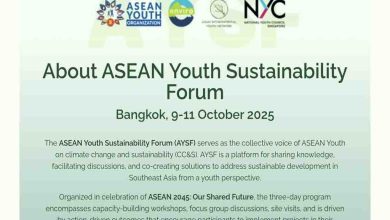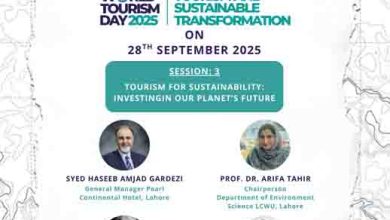Climate-Smart Agriculture Training Course Begins at NARC, Islamabad
The 10-day climate-smart agriculture training course using nuclear techniques has started at NARC, Islamabad, with participation from 21 countries.
A landmark climate-smart agriculture training course kicked off this Monday at the National Agriculture Research Center (NARC) in Islamabad. The 10-day regional event is organized by the International Atomic Energy Agency (IAEA) in partnership with the Pakistan Atomic Energy Commission (PAEC) and hosted by Nuclear Institute for Agriculture and Biology (NIAB), Faisalabad. This initiative is a major step towards building sustainable agricultural practices across climate-vulnerable countries.
The climate-smart agriculture training course aims to equip participants with advanced knowledge on using nuclear and isotopic techniques to develop climate-resilient farming systems. The inaugural ceremony took place at the NARC Auditorium, attracting a distinguished audience of global scientists, agricultural experts, and government officials.
Dr. Raja Ali Raza Anwar, Chairman of the PAEC, was the chief guest, marking the course as a milestone in Pakistan’s journey toward climate resilience.
“If we fail to modernize agriculture, crop yields in Pakistan may drop by 50% by 2050,” warned Dr. Anwar.
PAEC Chairman Highlights Climate Challenges
Dr. Raja Ali Raza Anwar emphasized that Pakistan is among the nations most affected by climate change. He pointed out that changing weather patterns, rising temperatures, and erratic precipitation are already affecting agriculture productivity.
He referred to the recent hailstorm in Islamabad as a stark example of climate volatility, highlighting how it damaged vehicles, buildings, and crops alike. Dr. Anwar urged the adoption of modern agricultural techniques like drip irrigation, climate-tolerant seeds, and precision farming, all of which are part of the training module.
He proudly shared that PAEC’s six nuclear power plants have already supplied 170 billion units of electricity, contributing 25% of the winter energy mix despite having only 7.7% of the installed capacity.
“Nuclear energy, endorsed by the IAEA, is a reliable solution for climate mitigation,” he added.
IAEA Expert Warns of Global Agricultural Crisis
Dr. Mohammad Zaman, Section Head at IAEA’s Soil and Water Management Program, Vienna, delivered an eye-opening address. He emphasized that global food production must increase by 80-100% to meet future demands while tackling climate-induced stress on water and soil.
Dr. Zaman praised Pakistan’s successful mitigation of salinity issues, describing it as a global model. He also raised concerns about the infiltration of microplastics into human DNA, describing it as a “hidden danger” affecting soil, plants, and food chains.
“This training isn’t just academic—it’s a response to a planetary emergency,” said Dr. Zaman.
Regional Participation and Global Significance
Dr. M. Yussouf Saleem, Director of NIAB, welcomed the attendees, highlighting the international reach of the training course. A total of 45 participants from 21 countries, including 36 international delegates and 9 local experts, are undergoing training.
Two leading IAEA experts are also on-site to deliver lectures, offer guidance, and conduct field demonstrations. The training will initially continue in Islamabad for a week, followed by sessions in Faisalabad at NIAB, concluding on May 2, 2025.
Countries Represented: Bangladesh, Egypt, Iran, Jordan, Kenya, Malaysia, Nigeria, Sri Lanka, Turkey, Uganda, and many more.
Future Plans and Technical Cooperation
Dr. Ghulam Muhammad Ali, Chairman of Pakistan Agriculture Research Council (PARC), highlighted the agency’s pivotal role in building research-driven policies to promote sustainable agriculture. He praised the PAEC-NIAB-IAEA collaboration as an exemplary model of science diplomacy.
Dr. M. Akhtar, Deputy Chief Scientist at NIAB, outlined the training schedule and learning outcomes, including:
-
Use of isotopic techniques in crop nutrition
-
Water-use efficiency measurement
-
Nuclear methods for soil fertility analysis
-
Integrated climate-smart farming models
The technical cooperation between PAEC and IAEA underlines a shared commitment to leveraging peaceful nuclear technologies for global food security.
Final Thoughts
The climate-smart agriculture training course at NARC is not just a scientific event—it’s a strategic intervention aimed at protecting future generations. As the climate crisis deepens, it is crucial for countries, especially those vulnerable like Pakistan, to embrace innovative and evidence-based solutions.
With its wide participation, focus on nuclear applications, and commitment to sustainability, this course is setting new benchmarks for climate action in agriculture.
External Resources and Further Reading
Internal Link Suggestions:







